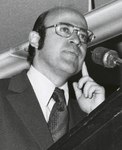Campaign
After Abrams emerged as the nominee, the Democrats remained divided. In particular, Abrams spent much of the remainder of the campaign trying to get Ferraro's endorsement. [13] Ferraro, enraged and bitter after the nature of the primary, [7] [11] ignored Abrams, and accepted Bill Clinton's request to campaign for his presidential bid instead. She was eventually persuaded by state party leaders into giving an unenthusiastic endorsement, with just three days to go before the general election, in exchange for an apology by Abrams for the tone of the primary. [13]
Abrams was also accused of engaging in ethnically charged attacks against the Italian ancestry of both Ferraro and D'Amato. Ahead of the primary, Ferraro sought to defend herself against accusations that she received financial support from organized crime in her 1978 congressional campaign, claiming that, "If I were not Italian American, this whole thing would never have been brought up." [14] In October, Abrams was again accused of anti-Italian political attacks, after calling D'Amato a "fascist" at a campaign event and alleging that he had engaged in the "big lie techniques" of Nazi propaganda officers. [15] At a Columbus Day parade the following day, D'Amato accused Abrams of engaging in ethnic insults on his Italian ancestry, and in a subsequent campaign ad featured images of Italian fascist leader Benito Mussolini to depict the word "fascist" as an anti-Italian slur. [16] Abrams narrowly lost the general election, partially as a result of these controversies. [17]




